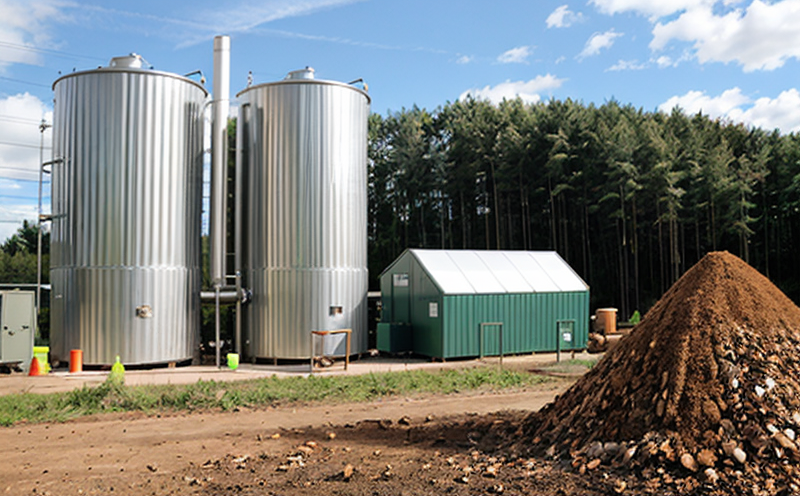EN 15407 Chlorine Content in Waste-Derived Fuels
The European standard EN 15407 provides a comprehensive method to determine the chlorine content of waste-derived fuels. This is crucial for ensuring that these fuels meet stringent quality standards, which are vital for efficient and safe utilization in waste-to-energy conversion processes.
Understanding the chlorine content is critical because high levels of chlorine can lead to significant challenges during combustion processes. Excess chlorine may form chlorides with other elements present in the fuel, which can cause corrosion issues within the combustion chamber of energy recovery facilities. This not only impacts equipment longevity but also increases maintenance costs and operational inefficiencies.
The standard specifies a procedure that ensures accurate measurement through precise sampling techniques followed by detailed analysis using advanced analytical instruments such as Inductively Coupled Plasma Optical Emission Spectroscopy (ICP-OES) or similar technologies. Compliance with this method guarantees consistent results, which are essential for reliable performance of waste-to-energy facilities.
For effective implementation, it is important to follow the prescribed sampling protocols carefully to avoid contamination and ensure representative samples are obtained from various parts of the fuel batch. Proper sample preparation is also critical; this involves drying, grinding, sieving, and homogenizing the fuel particles before analysis.
The analytical results provided by EN 15407 help operators make informed decisions about feedstock quality, optimizing combustion parameters to achieve maximum efficiency while minimizing potential risks associated with high chlorine content. By adhering to this standard, laboratories can provide reliable data that supports sustainable waste management practices and contributes positively towards environmental goals.
It is worth noting that the methodology outlined in EN 15407 aligns closely with broader industry standards aimed at promoting circular economy principles by valorizing waste materials into valuable resources. This approach fosters innovation in developing more efficient conversion technologies, thereby reducing reliance on fossil fuels and decreasing greenhouse gas emissions.
In summary, compliance with EN 15407 ensures accurate determination of chlorine content in waste-derived fuels, supporting safe and effective waste-to-energy processes. The standard plays a vital role in enhancing operational efficiency, ensuring regulatory compliance, and promoting sustainable practices within the sector.
Scope and Methodology
The scope of EN 15407 is to provide a standardized procedure for measuring the total chlorine content in waste-derived fuels intended for use in waste-to-energy processes. This includes both solid and liquid forms of such fuels, ensuring consistency across different types of feedstocks.
- Sample Preparation: Samples must be representative and taken according to specified procedures outlined in the standard.
- Analytical Techniques: The method allows for selection between various analytical techniques including but not limited to ICP-OES, XRF (X-ray fluorescence), or any other technique approved by the responsible authority.
The methodology emphasizes accuracy and precision throughout all stages from sample collection until final reporting of results. It sets strict guidelines regarding equipment calibration, reagent purity, and procedural controls to minimize errors and ensure reliable measurements.
By adhering strictly to these procedures, laboratories can generate robust data that supports sound decision-making by stakeholders involved in waste management and energy recovery operations. This not only enhances operational efficiency but also contributes significantly towards achieving sustainability targets set forth by regulatory bodies worldwide.
Eurolab Advantages
At Eurolab, we understand the importance of delivering accurate, reliable, and compliant results when it comes to waste-to-energy testing. Our team of experts is committed to providing high-quality services tailored specifically for your unique needs.
- Accurate Data: Leveraging state-of-the-art equipment and methods, our laboratory ensures precise measurement of chlorine content in waste-derived fuels.
- Compliance Assurance: We stay updated with all relevant standards like EN 15407 to guarantee that every test conducted meets current regulatory requirements.
- Expertise: Our experienced staff has extensive knowledge and experience in conducting these types of analyses, ensuring consistent high-quality results.
- Timely Deliveries: We prioritize prompt turnaround times without compromising on accuracy or precision. Quick turnarounds help keep projects moving forward efficiently.
- Supportive Consulting Services: Beyond just testing, we offer comprehensive consultation services to guide you through the entire process from sample preparation right up until final results are interpreted and presented.
Choosing Eurolab means choosing a partner dedicated to excellence in waste management and recycling testing. With our commitment to quality and customer satisfaction, you can trust us to deliver accurate, compliant results that meet your specific requirements.
Environmental and Sustainability Contributions
The analysis of chlorine content in waste-derived fuels as per EN 15407 plays a crucial role in promoting environmental sustainability. By ensuring proper management of chlorine levels, this process helps prevent corrosion issues within combustion chambers, thus extending equipment lifespan and reducing maintenance costs.
- Reduced Emissions: Lowering the amount of chloride compounds formed during combustion reduces emissions of harmful pollutants such as dioxins and furans.
- Resource Efficiency: Proper management allows for better utilization of waste materials, contributing to a circular economy where resources are reused rather than wasted.
- Economic Benefits: Efficient use of waste-derived fuels can lead to cost savings for operators by optimizing combustion processes and extending the life of machinery.
The accurate determination of chlorine content also supports compliance with international environmental regulations, which are designed to protect human health and ecosystems from adverse effects caused by improper disposal or utilization of hazardous substances. By adhering strictly to EN 15407, laboratories contribute significantly towards achieving these objectives.
Moreover, this testing contributes directly to the broader goal of reducing reliance on fossil fuels, thereby decreasing greenhouse gas emissions and promoting cleaner energy production methods. Through meticulous adherence to standards like EN 15407, Eurolab plays an integral part in fostering sustainable practices across various sectors involved in waste management and recycling.





